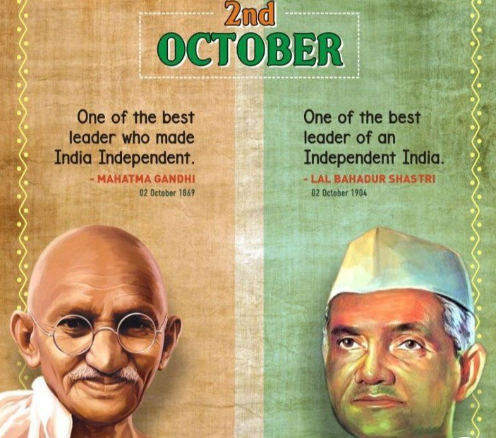Birth Anniversary of Mahatma Gandhi and Lal Bahadur Shastri (GS Paper 1, Modern Indian History)

Context
- October 2nd is a significant date in Indian history, marking the birth anniversaries of two of the nation’s most revered leaders: Mahatma Gandhi and Lal Bahadur Shastri.
- Both individuals played pivotal roles in shaping India’s path to independence and nation-building.
Key Facts About Mahatma Gandhi
- Birth: October 2, 1869, in Porbandar, Gujarat.
- Profession: Lawyer, politician, social activist, and writer.
- Notable Works:
- Hind Swaraj
- My Experiments with Truth (Autobiography)
- Death: Assassinated by Nathuram Godse on January 30, 1948. This date is observed as Martyrs' Day.
Role in India’s Freedom Struggle
- Leadership of the Indian National Congress (INC): Gandhi emerged as a prominent leader in the early 20th century, advocating non-violent resistance and mass mobilization against British rule.
- The Belgaum session in 1924 was notable as it was the only Congress session presided over by Gandhi.
- Non-Cooperation Movement (NCM) (1920-1922): Launched in response to the Jallianwala Bagh massacre and the oppressive Rowlatt Act, Gandhi called for a boycott of British institutions, goods, and honors, leading to widespread participation across the country.
- Salt March (1930): Gandhi led the iconic Salt March to Dandi, protesting the British salt tax. This event marked the commencement of the Civil Disobedience Movement.
- Quit India Movement (QIM) (1942): Gandhi urged for an end to British rule with his rallying cry, "Do or Die," inspiring millions to engage in protests and acts of civil disobedience.
- Philosophy of Non-Violence:
- Emphasizing Satyagraha (truth force) and Ahimsa (non-violence), Gandhi's principles guided peaceful protests and moral integrity. His influence extended beyond India, inspiring global civil rights movements led by figures such as Nelson Mandela and Martin Luther King Jr.
- International Day of Non-Violence: October 2nd is also recognized as the International Day of Non-Violence, established by the United Nations General Assembly on June 15, 2007.
Key Facts About Lal Bahadur Shastri
- Birth: October 2, 1904, in Mughalsarai, Uttar Pradesh.
- Position: Second Prime Minister of India.
- Notable Slogan: "Jai Jawan Jai Kisan," which highlights the importance of both soldiers and farmers in nation-building.
- Death: January 11, 1966, in Tashkent, Uzbekistan.
- Posthumous Honors: First recipient of the Bharat Ratna (1966).
Contributions to Nation Building
- Leadership During the 1965 Indo-Pak War: Shastri effectively led the nation through the war, enhancing national morale and unity.
- Green Revolution:
- Advocated for agricultural reforms that significantly increased food production, steering India toward self-sufficiency and addressing food security issues.
- National Integration:
- Focused on fostering unity among India’s diverse cultures, languages, and regions, promoting policies that encouraged industrialization and self-reliance to bolster economic growth.
- Civil Services Ethics:
- Shastri emphasized the importance of high ethical standards, transparency, and dedication among civil servants. Notably, he resigned as Rail Minister in 1952, accepting moral responsibility for a rail accident that resulted in casualties.
Conclusion
- The birth anniversaries of Mahatma Gandhi and Lal Bahadur Shastri serve as a reminder of their extraordinary contributions to India.
- Gandhi’s commitment to non-violence and social justice, along with Shastri’s focus on national unity and agricultural development, continue to inspire generations.
- Their legacies underscore the values of integrity, leadership, and service to the nation, which remain relevant in contemporary India.


